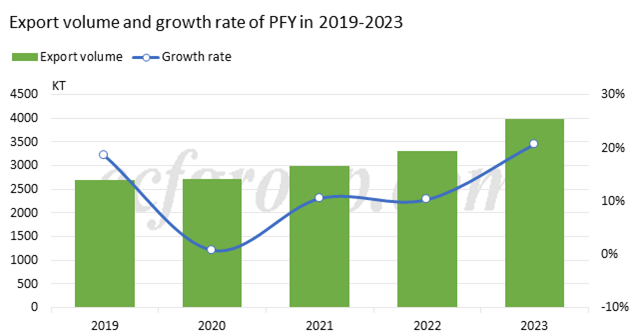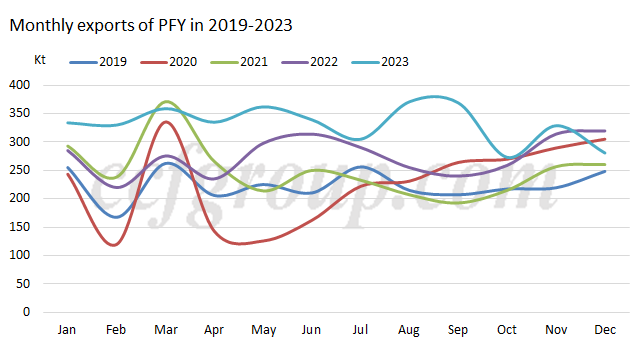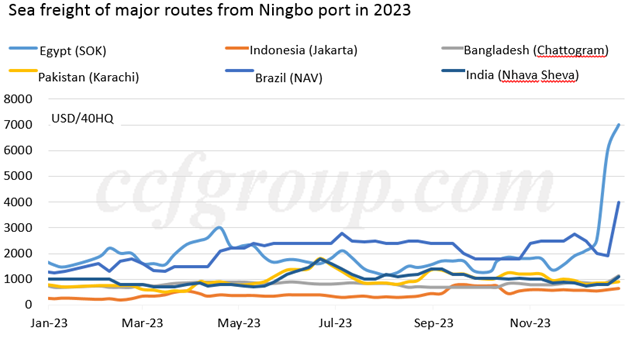China's PFY exports may see lower growth rate in 2024
According to the data from China customs, PFY exports approached 3990kt/year in China in 2023, up by 684kt/year or 20.7% on annual basis.

The reasons behind surging PFY exports in 2023: on one hand, fiber exports grew driven by the order transfer of textiles and apparels; on the other hand, it relied on the price competitiveness, especially compared with India. China's PFY snatched some market share in the world in 2023 due to the cost advantage (feedstock cost and production cost) and the rush of exports amid the BIS certification in India. It was learned that India had near 5 million tons/year of PFY capacity and units normally ran at above 60% of capacity in previous years, while the average operating rate was only at 40-50% in 2023 due to the losses caused by cost disadvantage, down by 10-15 percentage points. In addition, the local demand increased stably by around 6%. Shrinking supply needed to be filled by import, and import from China was a major source.
PFY exports to India grew the most in 2023, followed by Turkey and Egypt (buyers in Turkey and Egypt procured PFY from India before but they increased buying PFY from China in 2023). According to the data from China customs, the proportion of the top ten PFY export destinations rose by 2.4 percentage points to 74.4% in 2023. Exports of PFY to India reached 530kt, up by 74% year on year, refreshing record new. Exports to Egypt and Turkey exceeded 400kt, a year-on-year increase of 27.6% and 50.2% respectively, and their market share ascended by 10.6 and 10.1 percentage points respectively.
|
Top 10 export destinations of PFY in 2022-2023 by proportion |
||
|
Country/region |
2022 |
2023 |
|
India |
9.3% |
13.4% |
|
Egypt |
10% |
10.6% |
|
Turkey |
8.1% |
10.1% |
|
Brazil |
8.9% |
7.9% |
|
Pakistan |
9% |
7.8% |
|
Vietnam |
9.2% |
7.5% |
|
South Korea |
6.2% |
6.5% |
|
Indonesia |
4.2% |
4.7% |
|
Bangladesh |
4.4% |
4.1% |
|
Mexico |
2.7% |
1.9% |
|
Others |
28% |
25.6% |
As for monthly export, PFY exports kept growing under high growth rate in the first three quarters of 2023 driven by price competitiveness and the rush of exports amid BIS certification of India but failed to see high growth in Q4. The BIS certification starts implementation from Oct 5, 2023, not being extended again. The sea freight hiked in Dec amid the Red Sea tension. The delivery of goods to North Africa was in stagnation, greatly impacting exports. PFY exports apparently decreased.


In terms of 2024, PFY exports are expected to keep increasing with the order transfer of textiles and apparels. The progress of BIS certification in India should be highly concerned. Exports of Chinese polyester POY and FDY to India have been blocked due to the BIS certification in India. Meanwhile, the Red Sea tension has ended up with spiking sea freight, which greatly drags down PFY exports. If it continues, PFY exports are anticipated to move up in 2024 but the growth rate is likely to reduce.
- Top keywords
- Cotton Price
- Cotton Futures Price
- Cotton Futures
- CZCE
- PTA Futures Price
- Chemical Fiber
- Polyester Prices
- Wool price
- PTA Futures
- Shengze Silk
- China
- Yarn Price
- price
- China Textile City
- Fibre Price
- Benzene Price
- Cotton
- Index
- Cotton Index
- PTA
- fabric price
- NYMEX
- Top 10
- textile industry
- Spot Cotton
- Cotton Yarn
- Polyester Price
- Futures
- PTA Price
- cotton yarn price

